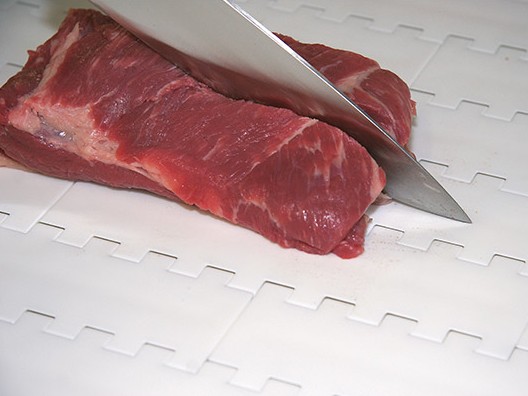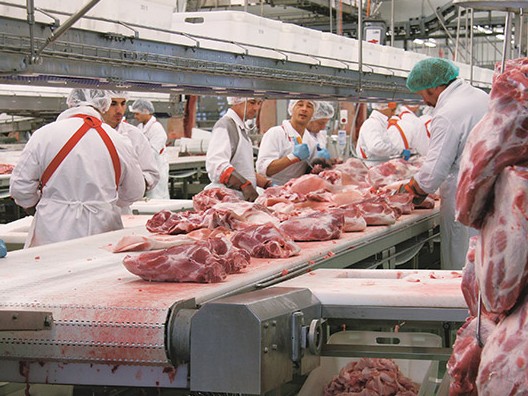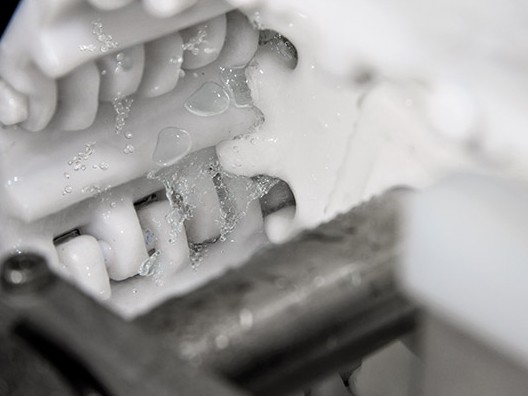
Conveyor belts, plastic modular belts, positive drive belts and conveyor chains: Habasit’s broad product spectrum offers literally endless options to meat-processing companies. “Because we are a full-range supplier, we always select the most suitable solution rather than trying to convince clients to buy a particular product,” emphasises Jan-Willem Geurds, Segment Specialist.
Habasit is right at home in the meat sector. “Not only thanks to our knowledge of the sector,” says Jan-Willem Geurds. “But also because of the many challenges the market holds. The meat sector is a significant link in the food chain and is often – in view of societal developments – at the basis of promotions or marketing concepts. We can be a strong industry partner.” He believes that the international aspect plays an essential role in this.
The company was founded in 1946, when Fernand and Alice Habegger registered their company and the Habasit brand. The company name is derived from a combination of ‘Habegger’, ‘Basel’ and ‘Bakelite’. Nowadays, Habasit is global market leader in the process and conveyor belt industry. The company – which is still owned by the Habegger family – generates an annual turnover of over CHF600 million and employs more than 3,600 people across 38 offices, with a presence in over 70 countries. Geurds: “We share our experiences of processes and trends with one another. That gives us a huge number of opportunities, such as for capitalising quickly on market developments, for knowledge exchange and for technical support.”
Habasit’s conveyor belts and plastic modular belts have been used successfully in the meat sector for many years. “They are robust, solid and ensure problem-free operational processes. Deciding factors are their long service life and the good price-quality ratio. Furthermore, our products help customers to save water, produce less product waste and achieve lower maintenance costs,” states Geurds. To illustrate his point, he says: “We have developed our Cleandrive homogeneous conveyor belts for hygiene-critical applications. These belts have a smooth surface, are hydrolysis-resistant and a completely closed design which prevents bacteria from entering. As a result, the belts are quick and easy to clean, which delivers considerable savings in terms of water consumption and maintenance hours. The Cleandrive belts are reinforced with aramid cords. These ensure that the belts do not stretch and they are fully embedded, spreading the tensile forces over the entire belt. That makes them ultra-stable and guarantees a secure engagement in the sprockets, without any auxiliaries.”
‘New production lines must increasingly be even faster, more efficient and more compact’
Because conveyor belts come into direct contact with meat products, it is essential that they comply with international food standards. “Therefore, we have a team of specialists who specifically focus on this, both at our headquarters in Basel and in The Netherlands. We’re happy to share our knowledge of the rules and regulations, including via our blog (www.habasit-blog.com).” Due to Habasit’s detailed knowledge and experience of a wide variety of production processes, customers often enlist the company’s help during the design phase. Geurds: “Nowadays, every large manufacturer expects their suppliers to provide maximum added value. We can act as a valuable sparring partner for the Engineering or Research & Development departments, such as when they are trying to choose the best belt, which can often be a difficult decision, or when designing and developing new production lines which increasingly need to be even faster, more efficient and more compact.”

In view of the fierce competition in the meat sector, companies are constantly looking for ways to set themselves apart, says Geurds. “Fast and flexible service is one thing that is high on the agenda, and another is the continuity of business processes. In response to that, we have developed a tool for manufacturers which gives them insight into the maintenance costs and service life for conveyor belts. Via this tool, they have 24/7 access to the maintenance data, also in the case of unexpected downtime. Furthermore, we offer various maintenance programmes to help optimise processes and reduce costs.”

VION Germany, for example, was looking for a solution for better and more efficient cleaning of its deboning lines. After testing various solutions, VION chose Habasit’s patented HyCLEAN plastic modular belts in combination with the cleaning-in-place (CIP) system, and this quickly delivered tangible results. Geurds: “Extra manual cleaning is no longer necessary, which saves not only time but also lots of water and chemical cleaning agents. Water pressure of between 20 and 40 bar is usually required for cleaning, but a pressure of 5 to 7 bar is sufficient with our CIP system. Customers who work with this CIP system have told us that they achieve water savings of up to 70%. That’s not only financially interesting, but is also perfectly aligned with a commitment to corporate social responsibility.” The system recently received EHEDG (the European Hygienic Engineering & Design Group) certification.
Source: Habasit